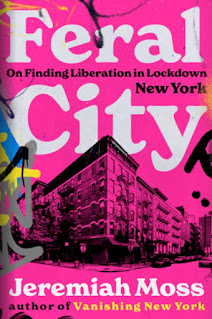"In place of [Jane] Jacobs's supersubtle network of human contacts, we would get demographically homogenized cities that celebrated absolute simplicity as hominess. (Witness the proliferation of restaurants with single, 'folksy' names: Egg, Can, The Farm, Home, Spoon, and--of course--Simple.)"

"...not even the metropolis dreamed of by the most Panglossian of gentrifiers could consist exclusively of bike-riding, cupcake-eating financial analysts. Gentrification had no jobs to offer--only Jane Jacobs-style 'neighborhoods.' The new IKEA-hoods that the corporations and their celebrity architects proposed were dystopias, to be sure..."

photo by Lori Nix
"Sex & the City, the greatest paean to credit card debt ever produced, gave us four professional, 'third-wave' women who consumed men and products with equal abandon... Now, in 2009, the city of Sex & the City is gone. Darkly silhouetted condominium towers--nobody home--haunt the skylines. The designer shoe stores are shuttered. Rents have plummeted. Gentrification, seemingly inexorable, has suffered an enormous setback."
But has it really? And how much of a setback is needed to save the remains of the city?
- You can find N+1 issue 8 at St. Marks Books
- How SATC Killed NYC
- Cupcake Trash
- Frozen New York



4 comments:
I really get tired of always being in the middle of gentrification--whereever I am--it is always happening--not once but now twice in the same place.
SATC has been worse for the City than the crack epidemic.
I really hate the use of the term "gentrification" to describe poor people in a neighborhood being replaced by working class people, and also working class people by middle class people, and middle class people by rich people.
In the grand scheme of things, there is no real benefit toward shifting people around a metropolitan area, which is all what gentrification (and the flight to the suburbs) really is. However, from a neighborhood standpoint, you want as many middle class and working class neighborhoods as possible, if your objective is to increase the number of businesses that most people want to actually use. A neighborhood can't support those businesses if its too poor OR too wealthy.
"Gentrification" and the changes Jeremiah describes is really just a manifestation of increasing inequality and the decline of the middle class.
I think there really is a plan to turn New York, or at least Manhattan, into some giant version of Aspen, but I think the flaw is going to turn out that the city is really just too big. They came close, but the powers that be would have had a better chance of pulling this off if they had tried a more manageable city in the Northeast, like Boston.
LOL @ Snuggle Bunny. It's true.
It's like an epidemic.
Post a Comment